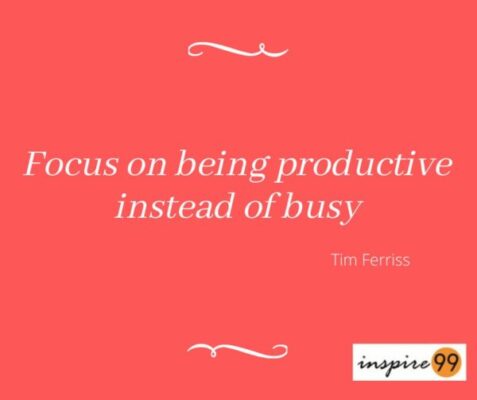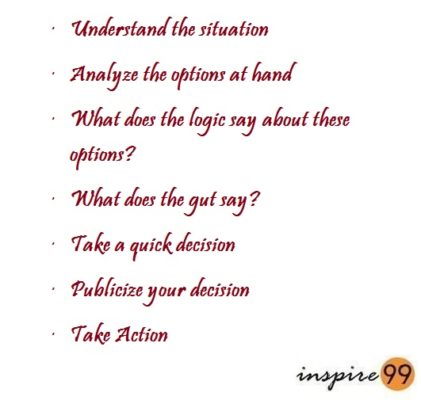Focus on being productive instead of busy – Discussion on how to be more productive. Being busy doesn’t mean that you’re productive. In fact, it is the opposite of productivity. It is our responsibility to make sure that we have time and energy for things that matter the most to us. If not, it is time to ask questions about where your time is being lost. And how can you regain it?
What is being productive?
I can forever recall an image of a huge list of things to do with very little time. Then a looming question pops up in my head – what is the meaning of being productive? Does it mean that we sacrifice all our time to achieve or complete a few things because they’re urgent? While thinking of this, another question comes up in my mind – what about work-life balance? After all, it is not only work that demands us to be productive.
While we can come up with many answers about priorities, goals and life’s dreams and visions – productivity from my perspective is about balance. We can loosely connect productivity to effectiveness. Unfortunately, sometimes we are trained to believe that being busy is productive. But you’ve got to ask another question – are you too busy to be productive?
Productivity in simple terms means the ability to create results that align with the most important things to you. It also ties closely with achieving great results, making sure that you reach the deadlines, etc. Again, something very important to remember here is that the quality of output cannot be compromised – so please ask that question – are you too busy to be productive?
Are you too busy to be productive?
Of course! We’re all too busy. Unfortunately, being busy or overworking are not signs of productivity. In fact, I would argue they’re the opposite of that. If you’re too busy to do things that are most important to you, then you’re missing something very important. You may be lost in doing less important things. We all do this, but I’m only pointing that we need to be conscious of it.
Hence the phrase – focus on being productive instead of busy and its meaning is closely intertwined with effectiveness and efficiency. Efficiency is making sure that we do things very well in a short span of time. Effectiveness however is doing the right things. They both must go hand in hand to ensure that you’re being productive. If you’re doing less important things – even in the most effective way, you’re clearly wasting time because you’re doing something which can either be done by someone else or worse – not required.
Being productive demands that you look into yourself critically and identify the best way to use your time.
6 Key Skills to Focus on being productive instead of busy
Thankfully, being productive is not rocket science. To be honest, it is a fairly simple exercise to ensure that you get the best results out of your time and life. We recently spoke about Time Management in Life Management. I’d like to impress the fact that productivity is not just about your work, but about creating enough time for your personal life. Work is only a part of your life and cannot overtake everything else.
The following thoughts represent key skills on how you can focus on being productive instead of busy.
Analyse/strategise before starting something
Every task you get can be pitched as important and urgent. Stop for a minute and question – is this important to me? If so, how? Every time, you say Yes to something, you’re eventually saying no to something else. This time sinks usually manifest as questions such as – do you have a quick minute? A brief call?
Experience has taught us that all these are myths. Things take time, they either take yours or someone else’s. Since you’re responsible for managing your time, you owe it to yourself to analyse. Pick a simple framework such as the 4 quadrants of time management to figure whether this is important or just urgent?
Identify your time sinks – track for awareness
We all have these patterns – some of them are unhelpful. These can be as simple as checking your phone often or trying to initiate small talk at work as a distraction. Either of these stands in the way of productivity. Focus on your patterns and start measuring or tracking them. Awareness is a wonderful thing. This exercise gives you data to focus on how much time is lost in the process.
Your time sinks are personal and differ from person to person. Look inwards and find out what’s most important to you.
Perfection Vs Progress
Perfection is not always helpful. You’re better off focusing on completion and delivering good quality. Although perfection can give great results, it might just be too late by the time you finish something. You can always improve and deliver better. But make sure that you have a second-best outcome ready so that you don’t risk incompletion. In many ways, incompletion is worse than a substandard outcome. (Related: Don’t wait for perfection)
I don’t mean to encourage that you do a bad job, but be aware that perfection can prevent you from progressing.
Time Management and prioritization
I’ll come back to this. Most times productivity is just about managing your time to get the best results. This will clearly include being very careful about your priorities and identifying what’s most important to you. There are other time management skills that will help you in the process. Common ones are mindfulness, grouping activities, preventing procrastination etc.
But prioritisation plays a huge role in ensuring that you finish the most important things. It is worse to have time to do unimportant but urgent things. Use a simple framework like the 4 quadrants of time management which helps you get through prioritization better. The most important point to remember is to ensure that you have time for what’s most important for you.
Saying NO to prevent being busy
A key factor to ensure that you’re not busy but productive is to say no to things that take up time. Saying No doesn’t mean that you’re rude. It only means that you’re prioritising what you need to do.
Also, remember that you don’t have to do everything by yourself. Use a framework like the 4Ds of time management to either delegate or deny some tasks. Delegation doesn’t mean that the task is unimportant. Delegation can mean that you can get it done better and quicker by someone else. Make sure that you use your time for which you can add the most value.
Procrastination
Being busy is easy, but productivity demands conscious strategy. Procrastination might be the thief of time. But it is necessary in some cases – for tasks which can afford to wait. However, be careful with procrastination because it creates an illusion that you have more time. (Related: How to stop procrastination)
Time is a fair resource – it doesn’t care for what the task means for you. So, if you’re procrastinating, make sure that it doesn’t compromise your priorities. In other words, focus on being productive instead of busy. Being busy is really easy – you can do nothing and still be busy. But being productive takes conscious effort and commitment.


Nice short to the point article, time management is definitely important to ensure your not just “busy” but actually getting things done.
Nice to read
Sometimes people are busy because they have nothing else to do!
That’s true – it is almost like finding things to fill in time. The most important question to ask is WHY and how important it is for us : )